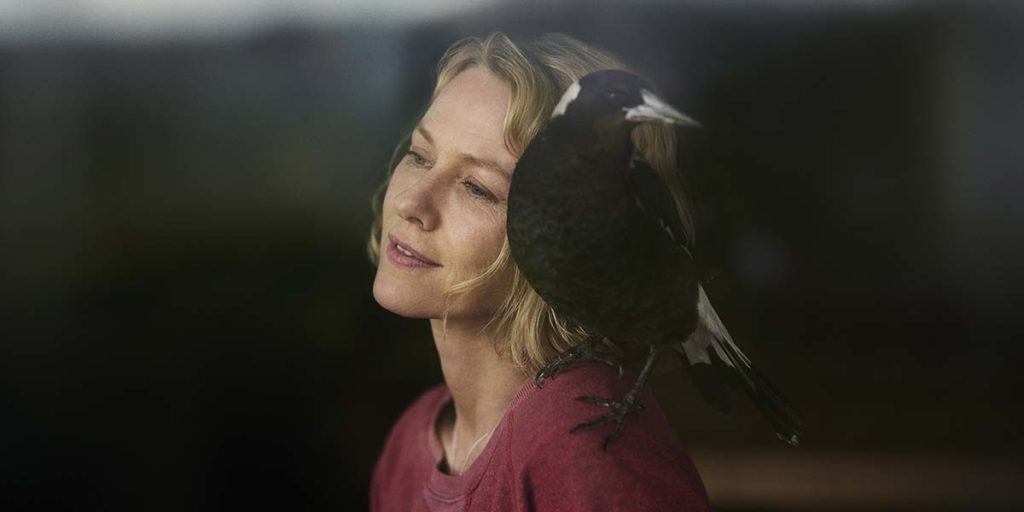Penguin Bloom

Image courtesy TIFF.
… or Bad Shit Always Happens To Naomi Watts While Vacationing In Thailand.
It’s almost a guarantee that a movie opening with the insert, “Based on a true story,” will disappoint. It’s like a disclaimer from the studio that, “Hey, we don’t make the stories, we just handpick them, finance them, cast them, send notes to dumb them down…” If I told you this wasn’t the first time the Imperiled White Woman trope took us to Southeast Asia, you’d probably nod along. What if I told you this wasn’t the first time Naomi Watts was cast as a healthcare professional, caught in a catastrophe, in Thailand, and it was “based on a true story?”
The thanks for the Award for Most Oddly Specific Typecasting owes to 2012’s THE IMPOSSIBLE. The film, about a physician and her family who get caught in the 2004 Indian Ocean tsunami that killed nearly a quarter million Southeast Asians. So, naturally, Hollywood’s response was to make a movie about a wealthy white family vacationing there. It gets even better. The film generated some controversy for the whitewashing of the story’s Spanish family—Belón became Bennett.
This formula that buyers’ reps obsess over, typically involves three key ingredients: A white woman, accident/tragedy, and vacationing in Thailand. I first caught on to this with 1999’s BROKEDOWN PALACE starring Claire Danes. Whether there was precedent or not, it just felt like it came from a canned formula.
Sam Bloom (Watts), a neuroscience nurse, becomes paralyzed from the chest down after falling off a rooftop on which she’d leaned against a rotted rail. Eventually, she finds purpose caring for an injured magpie the kids find and name Penguin. But the story takes some time to get there. A full third into the picture, Sam’s still wallowing in misery, and her son, Noah still narrates exposition in flashbacks that show little more than frolic and laughter—like those bizarre ads featuring women laughing alone with salad.
If the film, directed by Glendyn Ivin, established up front that she was a neuroscience nurse (they earn somewhere around six figures in Australia where the Bloom family lives) we might feel less sympathetic. Not that it matters terribly to me. We don’t get to pick what tragedies befall us, but this is a film, a product materializing from a series of decisions—consciously floated through a system run by and for, mostly, white people. How many minorities with disabilities couldn’t get anyone to look at their story because they didn’t have money or connections?
Blaming himself for her accident because he coaxed his parents onto that roof, Sam’s son Noah (still narrating the kind of video movie characters make when their mom/wife receives a diagnosis of Stage IV cancer), says, “Over 20 million people holiday in Thailand.” That’s 36.7 million fewer affluent people than there are persons with disabilities in the United States.
“5,475 other days,” Noah continues, “It could have broken, but it waited for mom.”
Yes, just imagine if that rail waited for a native Thai, whose average annual income is $3,300 USD. What exactly are the filmmakers trying to say here?
I can’t complain about the relationship between Sam and her husband, Cameron (Andrew Lincoln), or the actors performances. They do well with what they’re given. It’s just tiring to see the same tripe over and over again. The movie speaks in pedestrian aphorisms like, “It must be weird to have wings, and not be able to fly.”
The editor cuts to (wait for it)… The kids on a trampoline. I didn’t know this was a dark comedy.
At the same time, Sam spends so much of the movie wallowing in self-pity, drawing the curtains shut to avoid looking at the gorgeous shoreline and sunsets that it strains our capacity for empathy. I have a spinal injury. I’m very fortunate it didn’t paralyze me. I also have spastic diplegia, the mildest form of cerebral palsy. I’m not thinking about how hard it is to be me. I’m thinking about a kid I met in the hospital whose spastic quadriplegia was so bad that he died wasting away from the monstrous energy expenditure. He couldn’t consume enough calories to support his own existence. He was ten, and his parents went nearly broke just taking care of him.
I’m sure the real Sam Bloom isn’t thinking about how hard it is to be her, either. I’m sure as a healthcare professional she’s thankful for Australia’s public health system. And because she lives in Australia, and not, let’s say, the concrete-and-brick metropolis of Dallas, Texas, kayaking proves an uplifting alternative to the depressing atmosphere of a physical therapy clinic. In the movie, her instructor, Gaye Hatfield (Rachel House; the smart-alecky security chief in THOR: RAGNAROK), is a genuinely likable person who brings some regional character to this one-Caucasian-fits-all story.
The emotional payoff in the third act centers around a family breakthrough. Still taking his mother’s distant behavior personally, it becomes clear that Noah’s video (the source of the earlier narration) proffers a misguided penance. Of course, she doesn’t blame him, but it’s nice to see an actual conversation and not a series of platitudes about coping. It’s too late in the picture, though, and too incongruous with the family’s established behavior—they don’t have deep conversations. The Blooms feel like every other in the Family Adversity sub-genre—cardboard cutouts of whom we knew little before the accident except, you know, that they might have come straight from the set of a salad ad.
PENGUIN BLOOM is currently screening at the 45th Toronto International Film Festival.